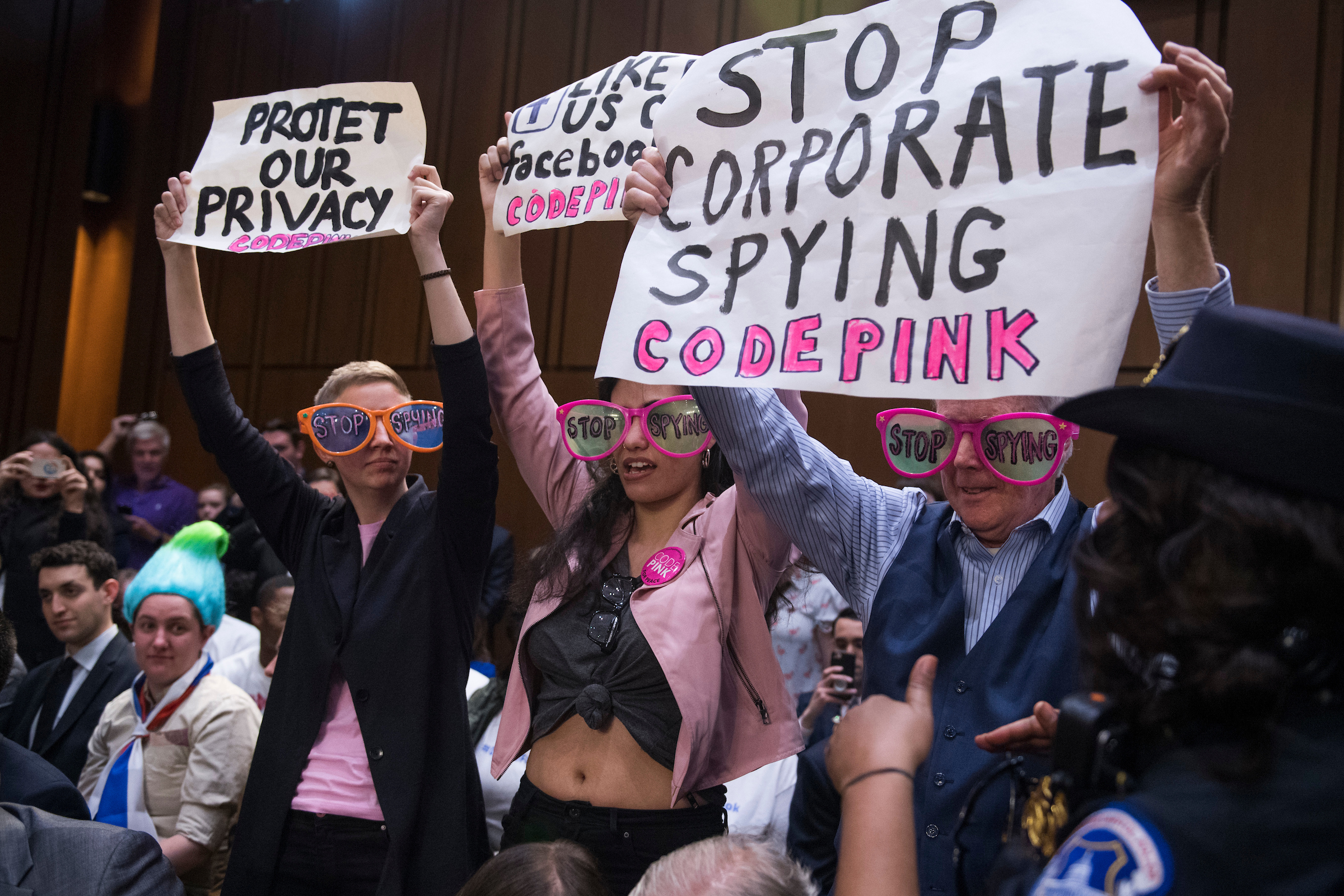Opinion: Mark Zuckerberg and the Theater of Contrition
But will it be enough?

The most insidious questions during a high-profile congressional hearing are often deceptively simple.
So it was Tuesday afternoon when Mark Zuckerberg, the pharaoh of Facebook, tried to ingratiate himself during questioning by nearly half the Senate.
Lindsey Graham highlighted Facebook’s dangerous market power by asking Zuckerberg in a friendly voice, “Who’s your biggest competitor?”
Clearly, the question had come up during the rigorous prep sessions and murder boards that Zuckerbeg had convened before his first public appearance on Capitol Hill. But all the spin artists retained by Facebook had failed to come up with a simple answer, so Zuckerberg tried to retreat to a three-part response to explain the competitive landscape.
With the clock ticking on his five-minute question time, Graham grew exasperated at the canned answer. So the South Carolina Republican broke in to ask, “You don’t feel like you have a monopoly?”
Zuckerberg gave a self-serving answer that might have come a century ago from the lips of John D. Rockefeller: “It certainly doesn’t feel like it to me.”
Watch: Some of the Most Colorful Moments of Zuckerberg’s First Hill Hearing
Invasion of privacy
A few minutes later, Illinois Democrat Dick Durbin began his questioning by disarmingly asking Zuckerberg, “Would you share with us the hotel you stayed in last night?”
It was easy to guess from the long pause and the look of bewilderment on Zuckerberg’s face that this was a query that had not been in any of the briefing books. Finally, the Facebook founder’s sense of personal privacy trumped his instructions to be responsive — and Zuckerberg declined to answer.
Durbin zeroed in on Zuckerberg’s reluctance to have his hotel revealed as an example of the privacy Facebook users “give away in modern America in the name of, quote, connecting people around the world.”
Those two questions — by Graham and Durbin — summarized the public case against Facebook: It has become a monopoly whose business model depends on violating the privacy of its users.
During Tuesday’s opening round of questioning, it was easy to mock the technological limitations of many senior senators. Clearly, some of them are charter members of the “My staff prints out my emails for me” caucus.
[Many Lawmakers Questioning Zuckerberg Used Facebook in Their Political Campaigns]
But the hearing was never about technology. Rather, it was about whether Zuckerbeg can head off federal regulation that might undermine Facebook’s business model. And that meant that the test Tuesday revolved around Zuckerberg’s theatrical abilities rather than any matter of substance.
When you create modern social media as a Harvard undergraduate and maintain control of Facebook through Wall Street IPOs and globe-girdling growth, you tend to live inside your own hoodie-wearing bubble without having to cater to the whims of the wider world.
Until now.
Just like the railroad monopolies that helped inspire the Sherman Antitrust Act of 1890, the 21st-century market power of Facebook makes eventual government regulation almost inevitable.
The only questions are what form will that regulation take and how long can a public apology tour by Zuckerberg delay crippling federal action.
Beginning with his opening statement, Zuckerberg consistently admitted error about small matters as he shunned the passive-voice equivocations (“Mistakes were made”) associated with shifty politicians. Instead, Zuckerberg said in a strong voice, “We didn’t take a broad enough view of our responsibility, and that was a big mistake. And it was my mistake. And I’m sorry.”
Zuckerberg tried so hard to be likable that it was almost as touching as it was elusive for him. His symbolic show of deference began with abandoning his gray T-shirts and jeans for a business suit, white shirt and loosely knotted blue tie.
The Facebook chieftain complimented California Democrat Dianne Feinstein — who is literally more than a half-century older than him — by saying, “Senator, that’s a great question.”
Somewhere around a dozen mentions, I stopped counting how often Zuckerberg earnestly promised a senator, “I’ll have my team get back to you.” And when Ted Cruz went into a rant about how Facebook muzzles conservatives, Zuckerberg tried to mollify the Texas Republican by conceding that the company is “located in the Silicon Valley, which is an extremely left-leaning place.”
Rise and fall?
But Zuckerberg’s modest demeanor was also an acknowledgment that Facebook’s dominance is more vulnerable than many assume. Remember that voters as young as 30 graduated from high school without sharing their prom pictures on Facebook.
A new CBS News poll, conducted by YouGov, found that more than 60 percent of Americans with a Facebook account deny that their use of the social media platform has changed their lives in any major way. Scarily for Zuckerberg, 28 percent of Facebook users also say they have considered deleting their accounts, presumably for privacy reasons.
Zuckerberg has to confront another reality on Capitol Hill. No matter what disclosures Facebook voluntarily promises, every congressional incumbent — regardless of party — should be worried about stealth attacks on their record and their character on social media.
Nothing in the regulatory fabric of politics has prepared us for the sudden dominance of social media as it vies to displace TV ads, which are public. It is akin to campaigns moving from speeches in a public square to off-the-record appearances inside a private shopping mall protected by burly security guards.
That is why a dominant emotion behind the Zuckerberg hearings was fear.
No one in Congress knows for certain what the shape of political campaigns will be in 2020. No one knows how much power has already been ceded to the secret algorithms at the heart of Facebook.
And that is why — despite his army of lobbyists and his dutiful attempts at contrition — Mark Zuckerberg will long be a target on Capitol Hill.
Roll Call columnist Walter Shapiro is a veteran of Politics Daily, USA Today, Time, Newsweek and The Washington Post. Follow him on Twitter @MrWalterShapiro.





